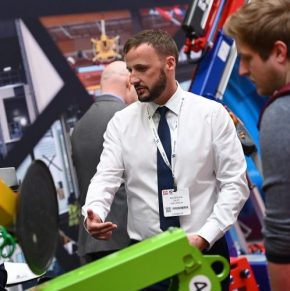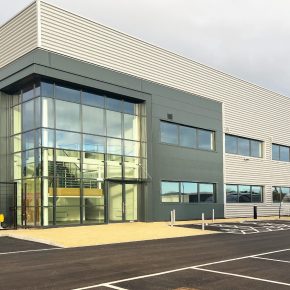
Ensuring the environmental sustainability of your construction project
Tony Smith, Director of ITC Concepts, discusses the role of environmental sustainability and the importance of introducing green agendas in the construction industry.
Environmental sustainability, and the role business has to play in it, is something we hear discussed more and more of late. Whilst relevant to all sectors, it’s a topic the construction industry has been paying increasing amounts of attention to.
This focus on environmental impact is more than just a passing trend. As we experience more of the effects of climate change, there will be increasing pressure from consumers, environmental groups and government agencies to reduce the environmental impact of projects and buildings – and rightly so, as we all have a role to play when it comes to sustainability.
While sustainability might be perceived by some as a commercial burden, this is often a misconception. Indeed, making sure your project is environmentally friendly can be widely beneficial in the long run for your company and the client, as well as the environment.
With this in mind, there are certain elements you should consider when looking to increase the sustainability of your project.
Materials
Perhaps the most instinctive element to consider: decisions about which materials will be used are incredibly important in any project.
 Choice of material can impact factors such as the aesthetics, acoustics, temperature, strength or longevity of any building or space. But, in addition to the innate sustainability of the materials themselves – for example, how much energy is required to make them or whether they contribute to unsustainable deforestation – these extra factors can also have an effect on the environmental impact of the specific project.
Choice of material can impact factors such as the aesthetics, acoustics, temperature, strength or longevity of any building or space. But, in addition to the innate sustainability of the materials themselves – for example, how much energy is required to make them or whether they contribute to unsustainable deforestation – these extra factors can also have an effect on the environmental impact of the specific project.
As such, whether a material is environmentally friendly is about more than just whether it is, or can be, recycled.
Choosing the right material means a careful weighing up of the short-term impact of sourcing that material and the long-term impact that it will have on the efficiency of the building. For example, making sure you’re aware of the efficiency of an insulation material and the consequent decreased need for heating it might bring to a building or space.
Foresight
Foresight is also an essential part of creating a sustainable project. A feature which might appear to be the most positive choice in terms of the environment right now might not seem that way in a few years if it needs replacement, adjustment, or constant maintenance.
Truly environmentally sustainable features are those where the benefits continue, or increase, throughout the building’s lifespan.
Being aware of this might mean you invest in tech or materials where the benefits are felt in the long- rather than short-term, or it might mean choosing a material that requires more energy to produce, but will have net positive impact in terms of the sustainability of the project.
Flexibility
Sustainable technology is developing rapidly, and will continue to do so as demand for it increases. Where this has most significance for the sustainability of your project is around the need to be flexible in your approach.
If the technological solutions you’re using become outdated and need to be replaced by something new, your business should be set up so that this is easily implementable. Whichever form that takes, your business and employees should have an open mind-set, ready to embrace new developments when it comes to sustainable tech.
Local environment
With any project it is essential to consider how our actions will affect the local environment. It is much better for the client if a project causes as little disruption as possible to their environment and those using it, as well as the environment of neighbouring companies, buildings or individuals.
 Another element of considering the local environment is making the most of local resources and reducing transport costs. Looking into whether resources and materials can be sourced locally is an important way to reduce environmental impact and positively influence the local community around the project.
Another element of considering the local environment is making the most of local resources and reducing transport costs. Looking into whether resources and materials can be sourced locally is an important way to reduce environmental impact and positively influence the local community around the project.
Taking any of these factors into consideration will alter the environmental repercussions of a construction project; on top of this, they can also increase the longevity of the project and foster a community around it.
The actions necessary for creating a reputation for sustainability and consideration will have positive effects long after the project is handed over – both for the future of your company and of the planet.
Latest news

2nd April 2025
FIT Show 2025 Launches Innovative Marketplace Feature to Enhancing Value for Installers
FIT Show, the UK’s leading event for the window, door, flat glass, hardware, and roofing industries, is excited to announce the launch of a brand new Marketplace feature at its upcoming 2025 event (Birmingham NEC, 29 April – 1 May).
Posted in Architectural Ironmongery, Articles, Building Industry Events, Building Industry News, Building Products & Structures, Doors, Exhibitions and Conferences, Glass, Glazing, Hand Tools, Innovations & New Products, Plant, Equipment and Hire, Power Tools, Restoration & Refurbishment, Retrofit & Renovation, Roofs, Seminars, Training, Windows
2nd April 2025
Hi-spec deployment of EJOT Colorfast at new Birmingham logistics park
EJOT Colorfast fasteners have been used extensively in the construction of eight new high-specification warehousing and logistics buildings at the Urban 8 Logistics Park in King’s Norton, Birmingham.
Posted in Articles, Building Industry News, Building Products & Structures, Building Systems, Case Studies, Facades, Restoration & Refurbishment, Retrofit & Renovation, Roofs, Walls
2nd April 2025
SWA member delivers ‘fresh Hope’ for university’s Sustainable Building department
A detailed contract to restore an iconic Art Deco building in the heart of Birmingham’s Jewellery Quarter was carried out by Steel Window Association member, The Window Repair Company (Northwest) Limited.
Posted in Articles, Building Associations & Institutes, Building Industry News, Building Products & Structures, Building Systems, Case Studies, Glass, Glazing, Restoration & Refurbishment, Retrofit & Renovation, Steel and Structural Frames, Sustainability & Energy Efficiency, Windows
1st April 2025
Gilberts Takes Thermal Comfort to New Heights
Gilberts Blackpool is continuing to build on its reputation as a pioneer with the unveiling of ThermaAstute™ – the most extensive range of thermally sensitive diffusers in the market.
Posted in Air Conditioning, Articles, Building Industry News, Building Products & Structures, Building Services, Facility Management & Building Services, Heating, Ventilation and Air Conditioning - HVAC, Innovations & New Products, Restoration & Refurbishment, Retrofit & Renovation, Sustainability & Energy Efficiency
 Sign up:
Sign up: